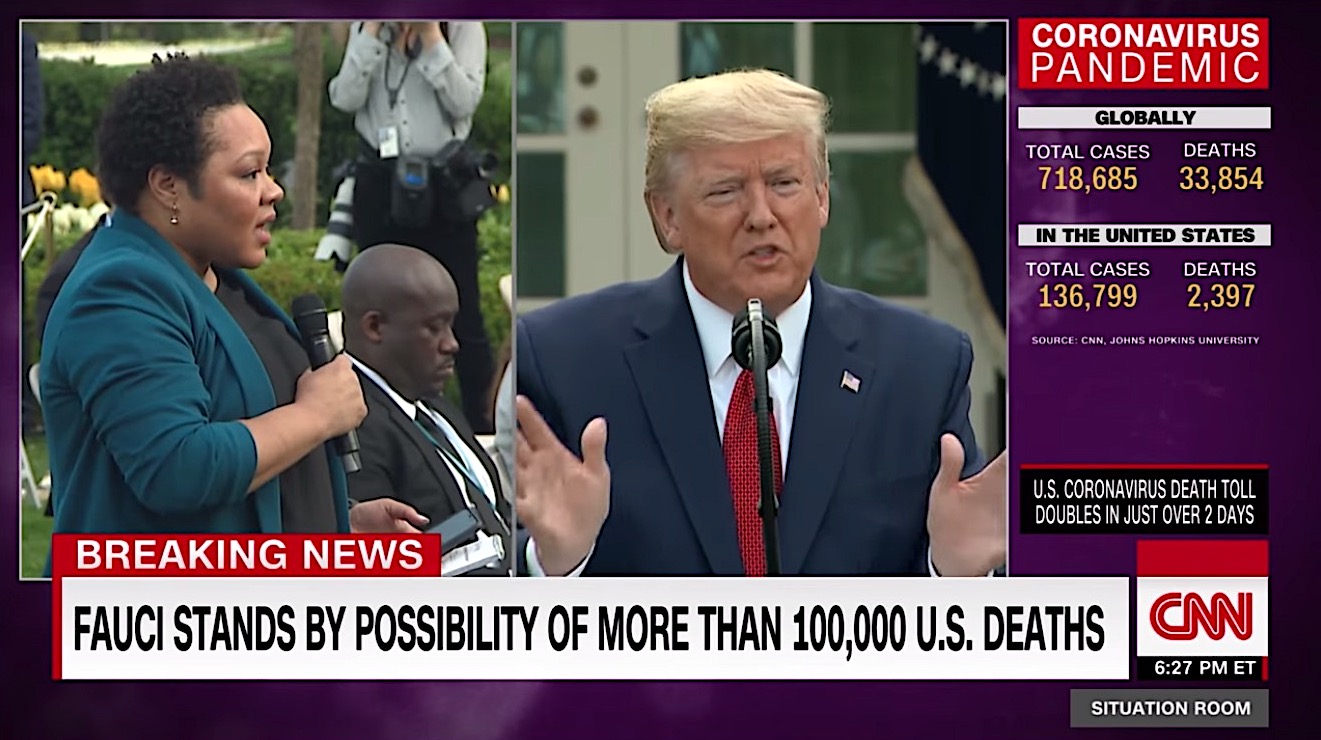Trump says he doesn't speak with 'nasty' governors but it doesn't affect the federal COVID-19 response


A free daily email with the biggest news stories of the day – and the best features from TheWeek.com
You are now subscribed
Your newsletter sign-up was successful
Last week on Sean Hannity's Fox News show, President Trump said he doubted New York really needed all the ventilators they are requesting from the federal stockpile so hospitals can treat the tragic influx of COVID-19 patients. In a press conference Sunday, PBS NewsHour's Yamiche Alcindor asked Trump about how those comments might affect the parceling out of the federal stockpiles to states. Trump incorrectly claimed he "didn't say that," told Alcindor to "be nice — don't be threatening," then, after letting her finish the question, said it wouldn't affect how the equipment is distributed. Trump shared an anecdote about sending "generators" to New York and suggested they disappeared from the warehouse.
"When journalists get up and ask questions that are so threatening," Trump said, and Alcindor cut in: "I was quoting you directly from your interview with Sean Hannity." She tried to ask a second question, and Trump cut off her mic. When Trump called on CNN's Jeremy Diamond later, Diamond gave the mic to Alcindor to ask her follow-up, which was about deaths from the economic shutdown versus COVID-19.
Diamond then questioned if Trump was envisioning suggesting a regional relaxation of social distancing before April 30 — Trump said no — and asked about Trump's comments to governors on Friday: "You said, 'I want them to be appreciative.' You also said, 'if they don't treat you right, I don't call.'" "I didn't say that," Trump said. "These are direct quotes, sir," Diamond replied, reading the full quote. Trump quibbled with the "appreciative" quote but agreed he doesn't speak with certain governors, like the "nasty" Jay Inslee: "I don't like the governor of Washington, so do you know who calls? I get Mike Pence to call, I get the head of FEMA to call." He added that he wants the governors to appreciate not him, but the government's response, and called CNN "fake news." Watch the entire exchanges below, on CNN. Peter Weber
The Week
Escape your echo chamber. Get the facts behind the news, plus analysis from multiple perspectives.

Sign up for The Week's Free Newsletters
From our morning news briefing to a weekly Good News Newsletter, get the best of The Week delivered directly to your inbox.
From our morning news briefing to a weekly Good News Newsletter, get the best of The Week delivered directly to your inbox.

A free daily email with the biggest news stories of the day – and the best features from TheWeek.com
Peter has worked as a news and culture writer and editor at The Week since the site's launch in 2008. He covers politics, world affairs, religion and cultural currents. His journalism career began as a copy editor at a financial newswire and has included editorial positions at The New York Times Magazine, Facts on File, and Oregon State University.
-
 One great cookbook: Joshua McFadden’s ‘Six Seasons of Pasta’
One great cookbook: Joshua McFadden’s ‘Six Seasons of Pasta’the week recommends The pasta you know and love. But ever so much better.
-
 Scientists are worried about amoebas
Scientists are worried about amoebasUnder the radar Small and very mighty
-
 Buddhist monks’ US walk for peace
Buddhist monks’ US walk for peaceUnder the Radar Crowds have turned out on the roads from California to Washington and ‘millions are finding hope in their journey’
-
 Trump HHS slashes advised child vaccinations
Trump HHS slashes advised child vaccinationsSpeed Read In a widely condemned move, the CDC will now recommend that children get vaccinated against 11 communicable diseases, not 17
-
 FDA OKs generic abortion pill, riling the right
FDA OKs generic abortion pill, riling the rightSpeed Read The drug in question is a generic version of mifepristone, used to carry out two-thirds of US abortions
-
 RFK Jr. vaccine panel advises restricting MMRV shot
RFK Jr. vaccine panel advises restricting MMRV shotSpeed Read The committee voted to restrict access to a childhood vaccine against chickenpox
-
 Texas declares end to measles outbreak
Texas declares end to measles outbreakSpeed Read The vaccine-preventable disease is still spreading in neighboring states, Mexico and Canada
-
 RFK Jr. shuts down mRNA vaccine funding at agency
RFK Jr. shuts down mRNA vaccine funding at agencySpeed Read The decision canceled or modified 22 projects, primarily for work on vaccines and therapeutics for respiratory viruses
-
 Measles cases surge to 33-year high
Measles cases surge to 33-year highSpeed Read The infection was declared eliminated from the US in 2000 but has seen a resurgence amid vaccine hesitancy
-
 Kennedy's vaccine panel signals skepticism, change
Kennedy's vaccine panel signals skepticism, changeSpeed Read RFK Jr.'s new vaccine advisory board intends to make changes to the decades-old US immunization system
-
 Kennedy ousts entire CDC vaccine advisory panel
Kennedy ousts entire CDC vaccine advisory panelspeed read Health Secretary RFK Jr. is a longtime anti-vaccine activist who has criticized the panel of experts
